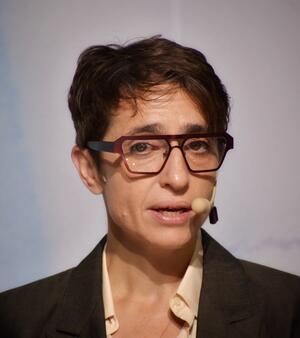Masha Gessen
Years of covering Putin’s regime in Russia made journalist Masha Gessen uniquely qualified to point out uncomfortable parallels between Putin’s leadership style and that of President Trump. Gessen immigrated to America in 1981 but returned to Russia in 1991 to work as a journalist. While in Moscow, they were often harassed as one of the few openly gay public figures and served on the board of the LGBT rights group Triangle from 1993 to 1998. They rose to become editor in chief of Vokrug Sveta, a popular science journal but were fired in 2012 after refusing to cover a Putin event they felt was propaganda. In 2013 they returned to America and wrote for The New York Times, The Washington Post, The Los Angeles Times, Slate, and many others; Gessen has been contributing to the New Yorker since 2014, becoming a staff writer three years later. They have written many books about the current political climate in Russia, including Dead Again: The Russian Intelligentsia After Communism (1997), Man Without a Face: The Unlikely Rise of Vladimir Putin (2012), and Words Will Break Cement: The Passion of Pussy Riot (2014). They also wrote Ester and Ruzya (2004), which examines the forces that shaped twentieth-century Russia through the lives of their two grandmothers. After the 2016 election, Gessen published articles and gave interviews on how to recognize and resist attempts by the Trump administration to silence the press and the public, based on what they had seen in Putin’s Russia. Gessen taught at Oberlin College and Amherst College in 2017 and 2018 respectively, then joined the faculty at Bard College in 2020 as a Distinguished Visiting Writer, a position they still hold as of 2023. In June 2023, they were named as a distinguished professor at the Craig Newmark Graduate School of Journalism at CUNY, where they will begin teaching during the Fall 2023 semester. Gessen has also had a hand in the development of the Russian Independent Media Archive since 2020.



